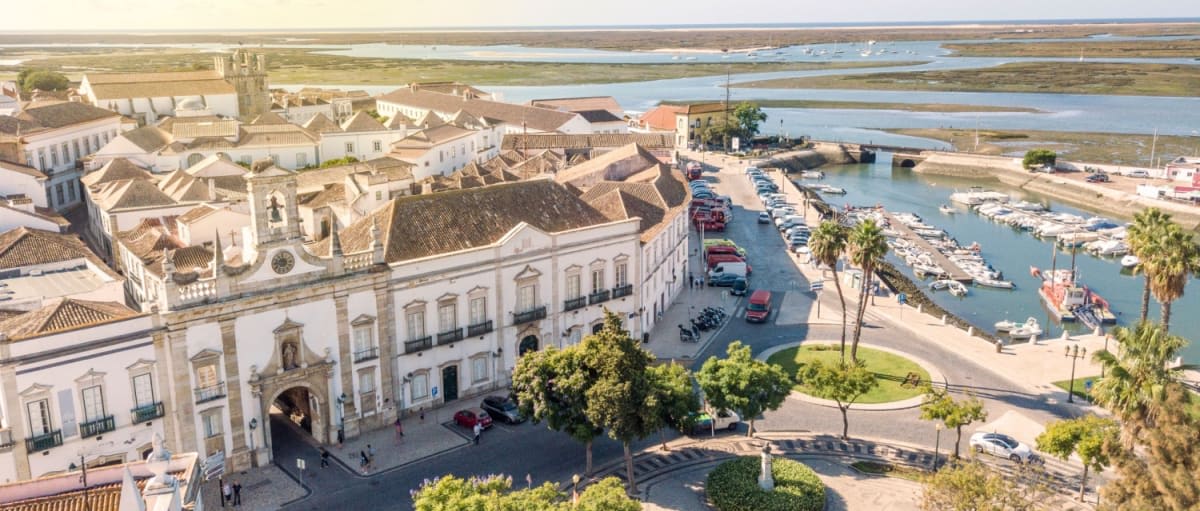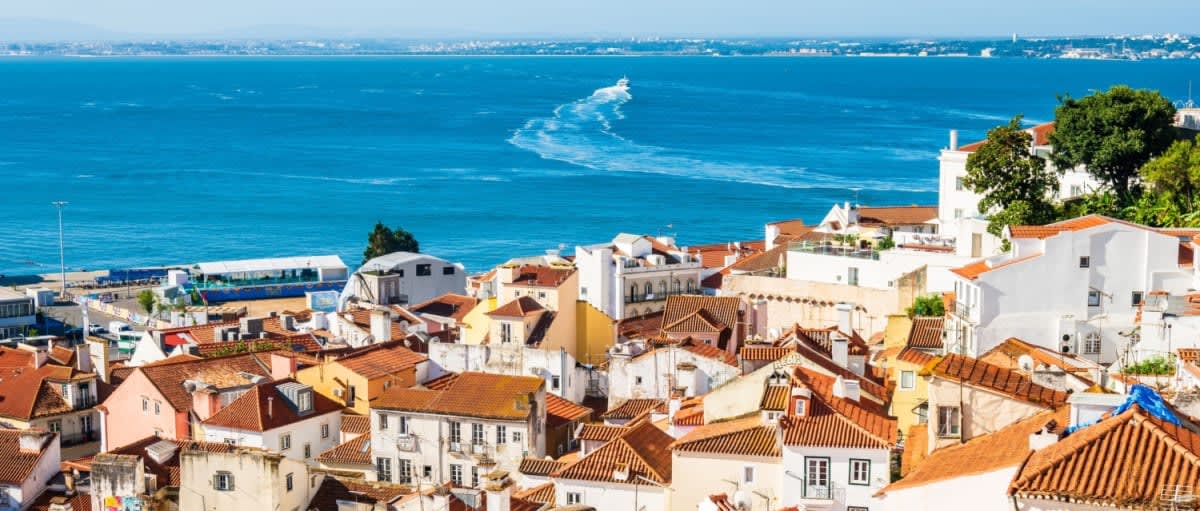Buying a home in Portugal remains one of the most popular choices for overseas buyers – and for good reason. With its appealing climate, affordable lifestyle and welcoming property market, Portugal attracts thousands of international homeowners each year. However, the official listing price of a Portuguese property only tells part of the story.
In 2025, buyers must navigate a range of additional costs that can significantly impact the final price. These include property taxes, legal fees, currency transfer expenses and ongoing maintenance obligations. Knowing what to expect in advance will help you budget accurately and avoid last-minute surprises.
Let’s break down all the essential property buying costs in Portugal. Whether you’re considering a city apartment in Lisbon or a villa on the Algarve, understanding the full cost of purchase is key to a smooth transaction.
Contents

IMT property transfer tax
One of the most significant upfront costs is the transfer tax, known in Portuguese as Imposto Municipal sobre Transmissões Onerosas de Imóveis (IMT). This municipal tax applies to both residents and non-residents, with rates calculated according to the purchase price, property type and whether it will be your primary residence.
The rates are applied on a sliding scale and can range from 0% to 8%. For instance, if you are buying a lower-priced home as your main residence, you may benefit from tax reductions or exemptions. Conversely, high-value properties or second homes attract higher rates. Urban properties are generally taxed at 6.5%, while rural dwellings are commonly subject to a lower 5% rate.
The Portuguese government’s official portal provides up-to-date tables and calculators for estimating your IMT liability. Always consult your notary or legal adviser for a precise figure based on your specific purchase.
For a step-by-step breakdown of the purchase process, claim your free copy of our Portugal buying guide:
Download the Portugal Buying Guide
Stamp duty in Portugal
In addition to IMT, you must also pay Portuguese stamp duty (Imposto do Selo). This is a flat-rate tax levied at 0.8% of the declared property value. It applies to both new and resale properties and must be paid before signing the final deed, usually at the notary’s office.
You can’t negotiate on this cast, and like IMT, only you as the buyer can pay it. Be cautious, as failure to settle this tax can prevent the transfer of ownership from being legally completed. It’s a relatively low percentage, but on high-value homes it can amount to several thousand euros. Always ensure this tax is accounted for in your budget.
Notary and land registration fees
In Portugal, the involvement of a notary is mandatory when buying property. The notaire (notário) is an impartial public official who verifies, records and authorises the sale. Alongside this, you must also register your ownership with the Portuguese Land Registry (Conservatória do Registo Predial).
Combined notary and registration fees typically cost around 1.5% to 2% of the property purchase price. In practical terms, budget somewhere between €1,000 and €2,000, depending on the deal’s complexity. Registration confirms the change of ownership and provides legal protection in Portuguese courts. Without it, you don’t officially own the home – even after completing all other steps.
Independent legal costs
Hiring an independent, English-speaking lawyer is strongly advised – especially if you are buying from abroad. Portuguese property law differs from the UK and elsewhere, and the purchase contract is always written in Portuguese.
Typical legal fees range from 1% to 3% of the property’s value. Some lawyers charge a flat rate instead. While it may be tempting to cut costs here, remember that your lawyer is your protection against fraud, poor contracts and unregistered modifications.
You can find approved legal partners through Your Overseas Home, just consult our Portuguese experts page. All will ensure full due diligence is completed – including checks on planning permission, debt liabilities or boundary disputes that could affect your title.
IVA on new-builds
New-build homes in Portugal are subject to Value Added Tax (IVA), currently set at 23%. This is only applicable to newly completed or off-plan properties and should always be included in the advertised price. Resale properties are not subject to IVA but will still incur the other buying costs mentioned earlier.
Always check with your agent or developer to confirm whether IVA is already factored into the asking price. If you are buying directly from a builder, also ask whether fixtures, finishes and parking spaces are considered separate VAT items. These surprises can increase your final payment substantially if not properly disclosed.
Currency exchange and international transfers
If you’re buying in a currency other than euros, currency exchange should be one of your top considerations. Exchange rate fluctuations can alter the cost of your purchase by thousands, especially during the gap between putting down a deposit and completing the transaction.
High-street banks often offer poor rates and charge transfer fees. In contrast, foreign exchange specialists like Smart Currency Exchange charge no fees on transfers over £3,000 and offer forward contracts to lock in good exchange rates. Book a call with Smart Currency Exchange to find out more about their services. These services allow you to know exactly how much your property will cost in your home currency, even if you’re completing in several months’ time.
In an uncertain global economy in 2025, working with a reputable currency provider is essential. It gives you greater confidence, budget stability and protection from market volatility.
Property surveys and inspections
Although property surveys are not required by law in Portugal, they are highly recommended – especially for older homes or rural properties. Unlike in the UK, many Portuguese buyers don’t commission surveys and instead rely on visual assessments. For international buyers unfamiliar with local construction, this can be a risky approach.
An independent survey will typically cost between €400 and €1,000 depending on the property’s size and location. This will include a comprehensive inspection highlighting any hidden damage, damp problems, roof conditions or foundation concerns.
For peace of mind, especially if you plan to let or renovate the property, a survey is a small but valuable investment. Your estate agent or lawyer can recommend bilingual surveyors to assist.
Utility connection and set-up fees
Once you’ve bought your home, you’ll need to arrange water, electricity and telecoms. If the service is already connected, you will simply need to change the account name. This is usually a straightforward process that costs around €50 to €150 per utility.
For unconnected homes – common in rural areas or new builds – connection fees can be higher, particularly if infrastructure needs upgrading. In such cases, you may also require planning permission. Check with your estate agent or lawyer at the buying stage so you can budget and avoid delivery delays.
It’s also wise to set up direct debits or automatic payments through a Portuguese bank account. This ensures you never miss a bill – especially if you plan to live overseas part of the year.
Ongoing property costs after your move
As a property owner, you’ll face several regular expenses beyond the purchase price. These vary depending on location, property style and whether you plan to live in Portugal full-time, part-time or rent out the home.
- IMI (municipal property tax): This is Portugal’s equivalent of council tax. Rates usually vary between 0.3% and 0.8% annually, depending where your home is registered and its official valuation.
- Community or condominium fees: For apartments or gated developments, this covers upkeep of communal areas like pools, lifts and gardens. These can be €300 to €2,500 per year or more.
- Insurance: Building and contents insurance is affordable – budget around €200 to €500 per year depending on coverage level.
- Maintenance costs: Set aside funds for general upkeep – plumbing, painting or structural maintenance. Expect to spend €1,000 or more per year on average.
Before completing your purchase, make sure to research the local cost of living and ongoing financial responsibilities. This will help you select a home that suits both your lifestyle and your long-term budget.
For more help with budgeting or managing your purchase from abroad, speak to one of our expert consultants. Your Overseas Home is here to guide you every step of the way – from viewing trips to final contracts.
Understanding the full costs involved is essential to making a confident and informed purchase in Portugal. From taxes and legal fees to currency exchange and ongoing expenses, being prepared will help you stay within budget and avoid unwelcome surprises. If you’re still deciding where to buy property in Portugal or need guidance on how to buy property in Portugal, our expert guides will walk you through every step of the process.
Frequently asked questions about the costs of buying property in Portugal
In general, expect to pay 8–10% on top of the property price to cover taxes, notary fees, legal fees and other charges.
IMT is the property transfer tax. It ranges from 0% to 8% depending on the property’s value, location and whether it’s a main or secondary residence.
Yes. Stamp duty is charged at 0.8% of the purchase price and must be paid before the deed is signed.
Notary and registration fees typically cost around 1.5% to 2%, while legal fees may range from 1% to 3% of the purchase price, depending on complexity.
Yes. New-builds are subject to VAT (IVA) at 23%, which is usually included in the sale price. Always confirm this with the seller or agent.
Using a specialist like Smart Currency Exchange allows you to lock in favourable rates and avoid transfer fees, helping you save thousands on large transfers.









